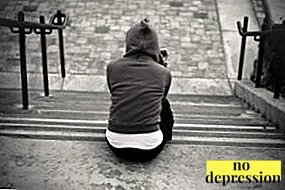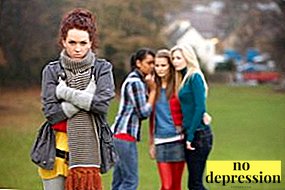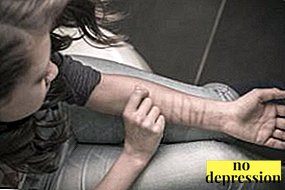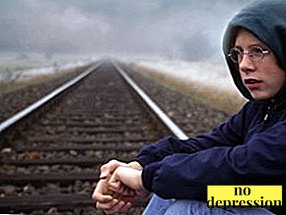Depression affects people of all ages, including children and adolescents.
Main signs of depression in adolescents - the extreme degree of depression, the feeling of hopelessness, the desire to move away from others, the loss of interest in activities that previously brought pleasure, thoughts of death.
Overview of Teen Depression

Depression - mental disorderin which the possibility of feeling joy and pleasure is impaired, the capacity for work decreases, various somatic deviations are observed, the desire to live disappears and thoughts of suicide arise.
It is the most common mental illness of all: every person at different periods of his life can get sick with a probability of 20-30%.
Depression and other mental disorders may occur in a child of any age, even in the period from birth to 3 years, but at an early age, the child is not able to fully realize his emotional state, so the symptoms manifest themselves in the form of somatic (physical) health problems.
The child refuses to eat, cries, sleeps poorly, he often has regurgitation, vomiting, he is slower than his peers, gaining weight, and his psycho-emotional and cognitive development are delayed.
The peak of the incidence of depression falls on the age of 15-25 years, that is, in the period when a person is looking for his place in the world and overcomes a huge amount of difficulties on the way to a stable and comfortable life. About 15-40% of people who are in this age period, live with depression.
Depression in adolescence widespreadthat is partly due to the peculiarities of this period, which include hormonal changes, changes in the views of oneself, others and society as a whole, a lot of internal conflicts.
However, it should not be considered that depression is normal for teens. This is a mental illness that can lead to fatal consequences, including suicidal attempts, disability, death. A frivolous attitude towards her as a feature of the age period is unacceptable.

Adults, especially those who prevail conservative views on life, tend to blame children’s mental problems for anything, from music, computer games, social networks to a lack of exhausting work (“You’re plowing like me, you wouldn’t have any depression!”).
At the same time, the real problems of adolescents (humiliation, beatings in an educational institution, difficulties in romantic relationships and creating social connections, phobias, anxiety about the lack of prospects for the future, chronic stress) they often choose not to notice or consider them insufficiently weighty.
It only worsens the condition of adolescents and kills their desire to trust their relatives, to seek their support.
It is important to understand that depression is a disease that can break a person’s life, and should not be underestimated. A teenager who is confronted with symptoms of depression needs help, not statements that depreciate it.
About the features of depression in adolescents in this video:
Causes
Factors that increase the likelihood of developing depression:
- Disturbances in the central nervous system. Most often, their occurrence is associated with the period of gestation and childbirth. Infectious diseases suffered by the mother during pregnancy (measles, rubella, cytomegalovirus infection, herpes, influenza and others), hypoxia (both during gestation and during birth), Rh-conflict, traumatic head injuries - all this increases the likelihood that later the child will have mental illness.
 Genetic predisposition. If among the close relatives of the child there are people who have depression and other mental disorders, this also affects the likelihood of developing depression in him.
Genetic predisposition. If among the close relatives of the child there are people who have depression and other mental disorders, this also affects the likelihood of developing depression in him.- Problems in the family, growing up outside the family. Separation from the mother is extremely painfully perceived by young children, which can be the foundation for the development of depression. Pupils of orphanages are also more likely to suffer from depression than their peers.
Alcohol, drug addiction among parents, constant scandals, domestic violence, parents divorce influence the formation of a sense of uselessness, hopelessness, meaninglessness in a child’s life.
- Features of the relationship of parents. Excessive care, emotional detachment of parents, increased control of actions, and the use of violence, including psychological, negatively affect the child’s psyche.
- Problems in the social environment. These include difficulties in establishing friendships in kindergarten, in school and other educational institutions, harassment, violence from surrounding children, excessive pressure and rigidity of teachers, problems in romantic relationships.
- Chronic stress. Increased mental load at school, especially in adolescence, strong pressure from teachers in connection with exams, unhealthy relationships with classmates - all this overly oppresses the psyche of a teenager. Also, the factors that create chronic stress include diseases of close relatives, care for the bedridden, tense situation in the family.
- Acute stressful situation: death of friends, close relatives, pets, getting into an accident, breaking a relationship with a partner and much more.
 Changes in hormonal background, which are natural for adolescence. They influence the behavior of a teenager, make him too sensitive.
Changes in hormonal background, which are natural for adolescence. They influence the behavior of a teenager, make him too sensitive.- Personality Features. Sensitive, creative children and adolescents who behave differently than others are more likely to suffer from depression.
Also important is the attitude of the child, the teenager to himself, formed under the influence of the environment. For example, some children are depressed because they do not manage to achieve what their parents expect from them, they feel stupid.
Causes of adolescent depression. How to understand what is happening? Psychotherapist comments:
Features of the disease in girls and boys
Depression occurs in girls one and a half times more often than in boys. They are also four times more likely than boys, trying to commit suicide, but they are often unsuccessful, as girls tend to choose less effective methods, such as swallowing pills or cutting veins.
Psychogenic depression, the development of which associated with trauma, they occur more often. During depression, girls may experience menstrual irregularities, up to amenorrhea - the disappearance of menstruation.
Depressed young men tend to become asocial: they can start drinking, taking narcotic drugs, and participating in questionable, criminal activities.
It’s harder for them than girls to analyze their inner experiences, understand that something is wrong, and ask for help. Some young men consider that a visit to a psychotherapist is a sign of weakness, which is a mistake. Also depressed young men more often show aggression.
Classification
There are the following types of depression:
 Clinical depression. The feeling of depression, loss of interest in familiar activities, deterioration or loss of ability to work, a negative view of the past, present and future, sleep disorders, suicidal tendencies persist for more than two weeks.
Clinical depression. The feeling of depression, loss of interest in familiar activities, deterioration or loss of ability to work, a negative view of the past, present and future, sleep disorders, suicidal tendencies persist for more than two weeks.- Minor depression. It appears milder than clinical depression, but at least two symptoms characteristic of clinical depression should persist for more than two weeks.
- Atypical depression. It is characterized by the presence of classic symptoms of depression, which are accompanied by daytime sleepiness, an increase in appetite, and weight gain.
- Dysthymia. For at least two years, a person is consistently observed low mood, but the set and features of the symptoms do not correspond to the classic depression.
- Recurrent depressive disorder. It manifests itself sporadically: for several days, symptoms of depression are observed, followed by a period during which they are absent.
The severity of depression can also vary from mild to extremely severe, when a person is practically unable to function due to his illness.
There is a test developed Aaron Beck, the founder of cognitive-behavioral psychotherapy, which allows you to identify depression independently and is able to roughly indicate its severity.
In ICD-10 There are four degrees of depression, depending on the set of symptoms and their severity:
- easy;
- moderate;
- heavy;
- severe, accompanied by psychotic symptoms (depressive hallucinations, delusions).

Also, depending on the causes of occurrence, there are endogenous and exogenous, or, otherwise, psychogenic depression.
Endogenous depression develops under the influence of internal factors (features of the nature and nervous system), and exogenous - under the influence of external (stress, traumatic events).
On the symptoms and signs of depressive syndrome in children and adolescents in this video:
Symptoms and signs
At the very beginning of the development of the disease the main symptoms of the disease come to the fore: depressed mood, lethargy, apathy, decreased interest in hobbies and familiar activities.
Later, as the disease progresses, the symptoms worsen.
The main symptoms depression (a set of symptoms may vary):
- pronounced depression of mood;
- the feeling that life is meaningless;
- the future is represented in dark colors;
- various disabilities, from moderate to extremely severe;
- loss or a pronounced decrease in interest in learning, hobbies, communication with friends;
- suicidal tendencies (thoughts about suicide; intentions to commit it, expressed in the fact that a teenager thinks about a way, studies information, thinks of what to write in a suicide note, and it’s not a fact that he will dare to do it; attempts of suicide);
- auto-aggression (a teenager scratches, cuts himself, leaves burns, chews fingers and lips to blood);
- a sense of worthlessness and uselessness;
- impaired cognitive functions (difficulty concentrating, problems with memory, attention, thinking is partially inhibited);
 impoverishment of mimicry;
impoverishment of mimicry;- sleep disorders (difficulty falling asleep, superficial sleep, daytime sleepiness, fatigue during the day, multiple awakenings at night);
- somatic disorders (headaches, dizziness, hair loss, weakness, tachycardia, drops in blood pressure, disorders in the stomach and intestines - pain, nausea, constipation, diarrhea);
- slow speech;
- apathy;
- loss of appetite and weight loss due to this;
- increased anxiety;
- irritability, aggressiveness;
- tearfulness, especially in girls;
- the feeling that nothing is strong enough;
- high fatigue.
In some cases, depression manifests itself so strongly that a teenager does not have enough strength to get out of bed. Despite this, parents may not notice for a long time the changes in the child’s condition or write them off for age features, be considered a sign of laziness.
Effects
The main danger of depression - suicidal mood. A large number of people who have committed suicide, who became disabled due to an unsuccessful attempt to kill themselves, suffered from depression.
Also, the disease can undermine the physical health of a teenager. This is especially true of the cardiovascular system and the gastrointestinal tract.
Depression takes strength away from a teenager, so he cannot lead a normal life, consciously make decisions about his future, learn productively.
It all can greatly complicate his further adaptation in society. Some adolescents, students in secondary special and higher educational institutions, are forced to leave them, because they do not have enough strength and desire to learn.
Diagnostics

Under the symptoms of depression serious somatic diseases may be hiding, for example, malignant brain tumors, both primary and metastatic, diseases of the thyroid gland, complications after infectious diseases and injuries.
Therefore, a teenager with depressive symptoms should undergo a series of examinations, including magnetic resonance imaging and computed tomography of the brain, electroencephalography.
If surveys have not revealed somatic abnormalities, the adolescent is sent to consultation to the psychotherapist and psychiatrist.
Experts interview a teenager about how he feels, about interests, relationships with others, assess his behavior, conduct a series of tests, talk with parents and make a diagnosis.
Depression children of preschool and school age - causes, symptoms and treatment:
How to treat?
What to do? When the diagnosis is made, the selection of the optimal drug therapy begins. Parallel is underway psychotherapeutic treatment.
Groups of drugs that are used in the treatment of:
- Antidepressants. Properly selected antidepressant can quickly eliminate the symptoms of depression and not lead to pronounced side effects. Examples: Prozac, Imipramine.
- Nootropics Improve cerebral circulation, increase cognitive activity. Examples: Piracetam.
- Atypical antipsychotics. Normalize mood, increase interest in life, reduce the severity of apathy. Examples: Aripiprazole.
Medicines are selected based on the individual condition of the adolescent and can be replaced by others in the course of treatment.

Without competent psychotherapy drugs will give only temporary effectwhich will disappear after cancellation.
In the treatment of depression in adolescents, widely used methods of cognitive-behavioral psychotherapy, which is based on working with automatic thoughts of a depressive nature.
It is also possible to use other types of psychotherapy as auxiliary, for example Hypnotherapeutic treatment and directions based on psychoanalysis.
How to help the child?
Dealing with depression alone is possible, but only in cases where it is weakly expressed, and most of the stressful factors are excluded.
In other cases, it is difficult to do without a psychotherapist. However, it is always possible to alleviate the symptoms if you work with the root causes of depression.
For independent work on yourself, a teenager may not have the strength, so it is important that next to him were kindly-minded people supporting him.
Tips for loved ones of a depressed teenager:
- Never condemn it., do not blame laziness, irresponsibility, selfishness and do not devalue his feelings. This will only worsen his health and increase the gap between you.
- Do not invent reasonswhich could explain the deterioration in mental well-being, especially if they are related to his hobbies. On the contrary, the interests of a teenager, even those that may seem wrong to adults (computer games, heavy music), give him the opportunity to feel better. If his trust is important to you and you want to help him, let him be what he wants to be. Ask him kindly why he likes to listen to such music and what he finds in games, and you can suddenly find out for yourself new sides, for example, that computer games have a complex, interesting, well-developed story that you want to dive into.
 Find out his own opinion about his condition. Perhaps he has problems at school, or he still hasn't gotten used to the thought of his friend's death, or it is difficult for him to survive the separation from his beloved person. If you can somehow influence the situation, for example, transfer to another school, do this by discussing your decision with a teenager beforehand.
Find out his own opinion about his condition. Perhaps he has problems at school, or he still hasn't gotten used to the thought of his friend's death, or it is difficult for him to survive the separation from his beloved person. If you can somehow influence the situation, for example, transfer to another school, do this by discussing your decision with a teenager beforehand.- Easy tell us about your methods of struggle with depressive symptoms, share a story from life. You can, for example, tell that you have been helped to feel better by sports, leveling the daily routine, socializing with friends, walking in the fresh air. You can also invite a teenager to do the same and see what happens.
The situation in the family should be friendly and relaxed, so that a teenager, when he comes home, feels needed and loved. Aggression, insults, beatings will not help to change his condition and will only aggravate the disease.
At the same time, it is important to understand that if the relationship with a teenager has not already been established, attempts to kindly talk with him may lead to nothing.
Also teen you can offer to read a book on self-work over a depressive state, for example, “Well-being. A New Therapy of Moods ”by Burns D., in which the mechanism of the onset of depression is described and a number of ways to solve problems are given.
Prevention
To reduce the likelihood of depression in a teenager, it is important:
- create a friendly atmosphere in the family;
- discuss problems with a teenager and look for solutions;
- не обесценивать его проблемы, относиться с пониманием ко всем его трудностям;
- не игнорировать изменения в его психическом самочувствии.
При первых признаках депрессии важно пройти все необходимые обследования и начать лечение. Это позволит ребенку быстро почувствовать себя лучше и ощутить, что в жизни есть смысл.

 Genetic predisposition. If among the close relatives of the child there are people who have depression and other mental disorders, this also affects the likelihood of developing depression in him.
Genetic predisposition. If among the close relatives of the child there are people who have depression and other mental disorders, this also affects the likelihood of developing depression in him. Changes in hormonal background, which are natural for adolescence. They influence the behavior of a teenager, make him too sensitive.
Changes in hormonal background, which are natural for adolescence. They influence the behavior of a teenager, make him too sensitive. Clinical depression. The feeling of depression, loss of interest in familiar activities, deterioration or loss of ability to work, a negative view of the past, present and future, sleep disorders, suicidal tendencies persist for more than two weeks.
Clinical depression. The feeling of depression, loss of interest in familiar activities, deterioration or loss of ability to work, a negative view of the past, present and future, sleep disorders, suicidal tendencies persist for more than two weeks. impoverishment of mimicry;
impoverishment of mimicry; Find out his own opinion about his condition. Perhaps he has problems at school, or he still hasn't gotten used to the thought of his friend's death, or it is difficult for him to survive the separation from his beloved person. If you can somehow influence the situation, for example, transfer to another school, do this by discussing your decision with a teenager beforehand.
Find out his own opinion about his condition. Perhaps he has problems at school, or he still hasn't gotten used to the thought of his friend's death, or it is difficult for him to survive the separation from his beloved person. If you can somehow influence the situation, for example, transfer to another school, do this by discussing your decision with a teenager beforehand.

